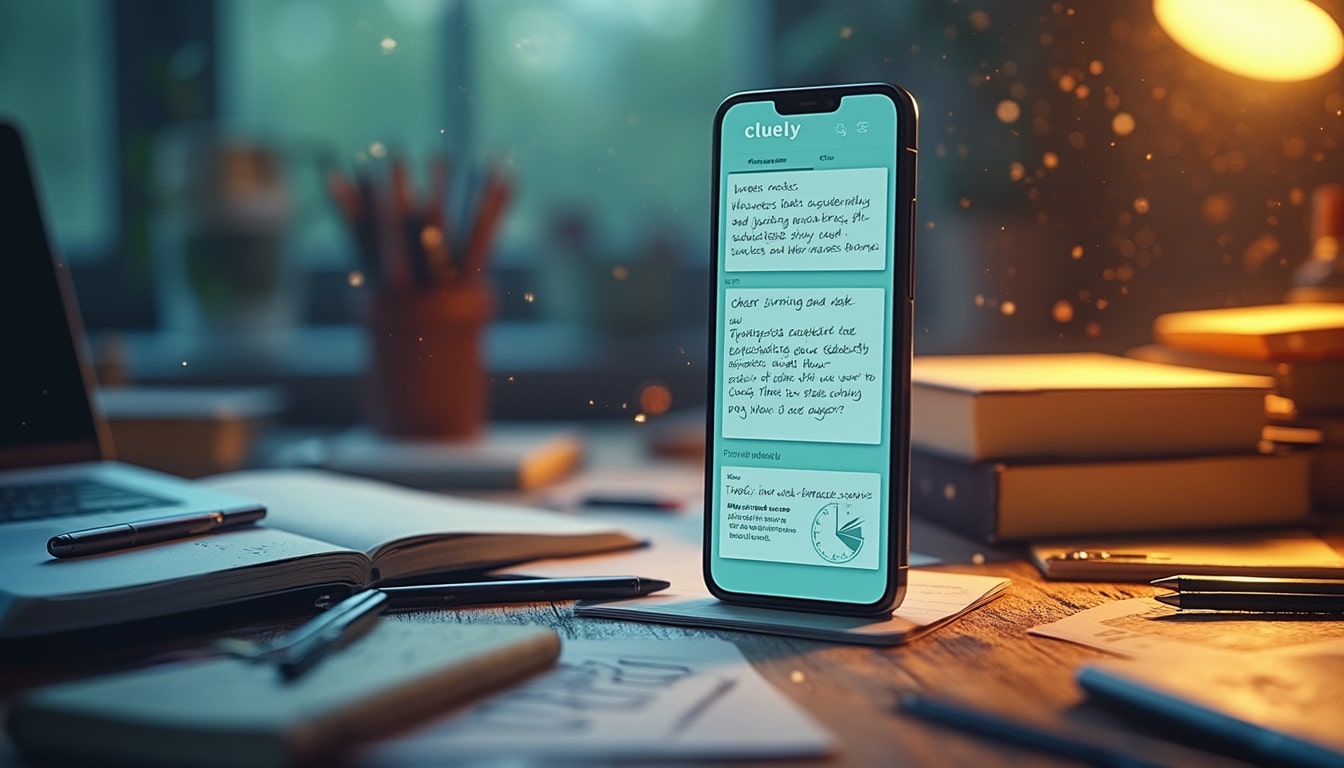« `html
Ever thought of having a sneaky helper during your exams? How about a whispering AI that feeds you answers in real-time? Welcome to the era of Cluely, where cheating has gone technologically sophisticated.
This invisible AI promises to keep you one step ahead, whether you’re tackling a tricky test, a technical evaluation, or even a nerve-wracking job interview. Behind this audacious concept are two former students who were once exiled from their university. Today, they’re steering a startup that’s pocketing a cool $5.3 million in funding.
Originally, Chungin Lee, a student at Columbia University, just wanted to boost his chances in interviews. Teaming up with a friend, he devised a discreet system that listens, monitors the screen, and suggests answers in real-time. When they were caught, expulsion was the immediate consequence. But instead of letting that setback stop them, they transformed their expulsion into a springboard for Cluely, evolving it into a full-fledged application designed for those eager to outsource their skills quietly.
The service operates like an invisible earpiece: the AI sees what you see, hears what you hear, and guides you seamlessly. According to its creators, it allows users to always stay a step ahead while others are left fumbling in the dark.
Cheating isn’t new; only the tools have evolved. Long before Cluely, cheating statistics in schools were already alarming. A 2007 study by Julia Christensen Hughes found that 53% of Canadian students admitted to recent cheating. The advent of AI has only expanded the possibilities. By 2023, a KPMG survey revealed that 52% of students now use AI for their assignments, with nearly 60% recognizing it as a form of cheating.
For educators, this presents an escalating challenge. C. J. James from KPMG Canada points out that teachers now need to understand and integrate AI into their teaching practices. Meanwhile, as educational institutions adapt slowly, the professional world is celebrating efficiency, often overlooking the underlying methods.
The paradox is glaring. What’s forbidden in universities becomes a celebrated asset in the corporate arena. Using AI to draft reports or respond to emails is viewed as a mark of efficiency. Automation is encouraged, even when it completely removes human input.
In this landscape, Cluely is merely fulfilling a demand. It professionalizes a widespread behavior while making it more accessible. The issue, as highlighted by Christensen Hughes, often stems from a lack of institutional response. When nothing is penalized, everything eventually becomes accepted.
When rules go silent, opportunists thrive. Cluely epitomizes an era where the line between cheating and performance blurs. The app transforms a scholastic misstep into a viable business model, and its founders, once penalized, are now gaining recognition from investors.
By delegating everything to machines, a critical question arises: what do we still expect from individuals if AI can handle it all?
Share the article:

« `html
Table of contents
Togglediscovering cluely: your invisible assistant for success
Imagine having an invisible AI whispering the right answers during your exams, guiding you through technical tests, or even assisting you in high-stakes job interviews. This is the promise of Cluely, a groundbreaking application designed to help users gain an edge in both academic and professional settings without getting caught.
how cluely was born from academic adversity
Cluely’s inception is as intriguing as its function. Founded by two students expelled from Columbia University, the app emerged from a place of adversity and ingenuity. Chungin Lee, one of the co-founders, initially aimed to maximize his chances during interviews. Collaborating with a friend, they developed a discreet system that listens, monitors the screen, and provides real-time answers. However, their innovative approach didn’t go unnoticed, leading to their expulsion. Instead of letting this setback halt their ambitions, Lee and his partner transformed their predicament into a start-up opportunity, securing $5.3 million in funding to bring Cluely to life.
the mechanics behind the invisible ai
Cluely operates like an invisible earpiece, seamlessly integrating into the user’s environment. The AI component is designed to see what the user sees, hear what they hear, and offer timely guidance. This real-time assistance ensures that users stay a step ahead while others around them are left guessing. By leveraging advanced artificial intelligence technologies, Cluely provides accurate and contextually relevant responses, making it an essential tool for those looking to enhance their performance discreetly.
features that set cluely apart
Beyond its primary function, Cluely offers several standout features:
- Real-time Monitoring: Continuously analyzes the user’s environment to provide relevant answers.
- Discreet Notifications: Delivers responses in a manner that’s unobtrusive and undetectable.
- Adaptive Learning: Learns from the user’s behavior to improve accuracy and relevance over time.
cluely in the context of academic dishonesty
The issue of cheating in education is not new. Back in 2007, a survey by Julia Christensen Hughes revealed that 53% of Canadian students admitted to cheating recently. The advent of AI has only expanded the avenues for dishonesty. According to a 2023 KPMG survey, 52% of students now use AI for their assignments, with nearly 60% acknowledging that it’s a form of cheating. Cluely taps into this growing trend, offering a sophisticated tool for those looking to bypass traditional academic challenges.
the professional world’s paradoxical stance on ai-assisted performance
While educational institutions grapple with the ethical implications of AI in learning, the professional realm has embraced it with open arms. C. J. James from KPMG Canada highlights the challenge educators face in adapting to and regulating AI use. In contrast, businesses view AI tools like Cluely as symbols of efficiency and progress. Automating tasks such as report writing or email responses is celebrated as a best practice, even when it minimizes human intervention entirely. This stark difference underscores a broader societal paradox where behavior deemed unacceptable in one context is encouraged in another.
cluely’s role in blurring the lines between cheating and efficiency
Cluely epitomizes an era where the distinction between cheating and performance enhancement is increasingly nebulous. By transforming a questionable practice into a business model, Cluely has professionalized what was once considered academic misconduct. The founders, once penalized for their actions, now enjoy the backing of significant investors, highlighting how opportunistic behaviors can thrive in the absence of clear institutional guidelines. As Julia Christensen Hughes points out, the lack of punitive measures often leads to widespread acceptance of such tools.
the ethical dilemma: delegating to machines
As Cluely and similar applications become more prevalent, a pressing question arises: what do we expect from individuals if AI can handle tasks on their behalf? This delegation challenges traditional notions of personal accountability and skill development. Relying heavily on AI could lead to a decline in critical thinking and problem-solving abilities, both in academic and professional settings. Moreover, it raises concerns about the authenticity of achievements and the potential devaluation of human effort.
case studies: cluely in action
Several users have reported transformative experiences with Cluely:
« Using Cluely during my final exams was a game-changer. I could focus on understanding the questions without the stress of finding the right answers under pressure. »
« In job interviews, Cluely helped me articulate my thoughts more clearly and confidently, leading to multiple job offers. »
These testimonials highlight Cluely’s impact on individual performance, showcasing its potential to significantly influence both academic and professional outcomes.
the future of ai in education and the workplace
As AI continues to evolve, its integration into various facets of life is inevitable. In education, institutions must develop robust frameworks to address the ethical use of AI tools like Cluely. This includes creating policies that balance technological advancements with the preservation of academic integrity. In the workplace, the focus should be on harnessing AI to augment human capabilities rather than replace them entirely. Striking this balance is crucial to ensuring that AI serves as a complementary tool rather than a disruptive force.
responding to the rise of ai-assisted tools
Governments, educational institutions, and businesses must collaborate to establish clear guidelines on the use of AI in both academic and professional settings. This involves:
- Implementing strict anti-cheating measures in educational institutions.
- Promoting ethical AI usage in the workplace.
- Encouraging transparency and accountability in AI development and deployment.
By taking proactive steps, society can mitigate the potential negative impacts of AI-assisted tools while maximizing their benefits.
conclusion: navigating the ethical landscape of ai
The emergence of Cluely underscores the complex interplay between technology, ethics, and human behavior. As AI tools become more sophisticated, it is imperative to address the ethical dilemmas they present. By fostering a culture of responsibility and transparency, we can ensure that advancements like Cluely are used to enhance rather than undermine our educational and professional systems.
additional resources and insights
For those interested in exploring the broader implications of AI in various domains, here are some insightful reads:














